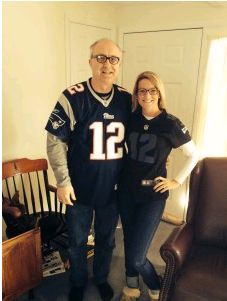
A trademark may make you money by rendering goods or services easier for your customers and potential customers to find. As I have written here in the past, trademarks are symbols of commercial original that tell consumers that they are getting the same thing that they got before. Theoretically, the higher the quality the more goods or services will be sold, and over time the number of people looking for your trademarked product will go up and you can raise the price charged for product based on market demand.
But how else can trademarks generate revenues for owners?
Trademarks can generate revenues through licensing to third-parties. Sports teams know this. A trademark's goodwill can extend to almost any good or service that consumers can associate with a brand – like Super Bowl merchandise.

Our Trademarkologist Mari-Elise and
her dad
sporting officially licensed Patriots Super Bowl gear.
Licenses are generally appealing where a mark carries significant consumer recognition, but the trademark owner does not have the capacity to manufacture goods or offer services outside of its core business area. Licenses traditionally generate revenues through royalty arrangements, by which a licensee pays to the trademark owner a percentage of sales in exchange for use of the mark. A solid licensing program requires planning and oversight. To being with, although the law does not require written licenses, you should always have one. Written licenses are evidence of ownership, royalties rates, and quality control standards.
Written or oral, a licensing relationship must be accompanied by quality control of goods or services by the owner of the mark. Courts have found everything from physical inspection of goods to written manufacturing standards to satisfy the quality control requirement that preserves an owner's rights in its mark. Lack of adequate quality control over use of a licensed mark may result in what is known as "naked licensing." Naked licensing of a mark over a sufficient period may render the mark susceptible to challenge on grounds that it has been abandoned by its owner. Once again, the law does not like the separation of goodwill from a mark with which it is associated, the thinking being that consumers may be harmed as a result.
So the next time you purchase "official" team sportswear you might appreciate that the higher price you pay goes to insuring that the product quality is commensurate with the goodwill created by the team in its brand and in your mind as a consumer.
Besides the "official" teams sportswear, part of what we love about the Super Bowl are the commercials. Check out this video for a preview of some of the 2015 Super Bowl commercials:
The lawyers at Trademarkology provide trademark registration services backed by the experience and service of one of the nation's oldest law firms. Click here to begin the process of protecting your brand name with a federally registered trademark.
The content of this article is intended to provide a general guide to the subject matter. Specialist advice should be sought about your specific circumstances.
